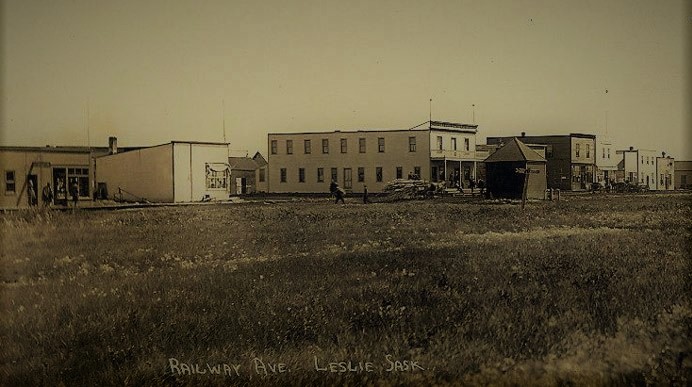
Leslie was a typical prairie town located by railway tracks. Photo is from the second decade of the 20th century. Photo: Prairie Towns.
When the C.P.R. railway reached Foam Lake, plans for the next railway station had already been made. The water tank in the steam engine required refilling on a systematic basis, so a station was built and soon construction of businesses such as a hotel, general stores and homes were started. Settlers in the surrounding areas would get their supplies in such villages. The village of Leslie was originally called Leslie Station in the honor of John Leslie, the business manager of the C.P.R company. Unlike similar villages on this railway line, Leslie grew at the same time that settlers arrived to homestead, not after the settlement had been established as was the norm. The reason for this was a landowner´s disappointment with the price offered him by the railway company for the land on which the tracks would be laid.
Businessmen started their businesses in early 1908 while the railway station wasn´t opened until 1909. One such man, C. P. Clark, opened a Post Office in 1909 and Tómas Þórðarson (Thomas Paulson), an implement store. He had homesteaded west of Foam Lake but eventually he sold his land and moved to Leslie. Hans Vilhelm Pálsson (W. H. Paulson), who emigrated to Winnipeg in 1883 and lived there until 1910, moved to Leslie and opened a hardware store. He was a candidate for the Liberal Party in the Saskatchewan provincial elections in 1912 and won. That was the beginning of a long, political career for Mr. Paulson. Þorvaldur Þorvaldsson moved to the village and opened a general store.
Leslie was the center of the Icelandic settlement which not only offered a variety of services and stores but also cultural events. People like the beforementioned Hans Vilhelm, and his wife Anna Nikulásdottir, Dr. Sigurður J. Jóhannesson, Rev. Runólfur Fjelsted and Páll Magnússon all lived there and contributed. Anna and Páll both were musicians; she founded a popular choir while Páll established a band of high quality. The annual midwinter festival (Þorrablót) was very popular, Icelanders from near and far attended every year. An Icelandic library was opened, and a reading society formed. Despite a promising start, the village could not compete with growing towns like Foam Lake and Elfros. Businesses closed and gradually people moved away from the village.
